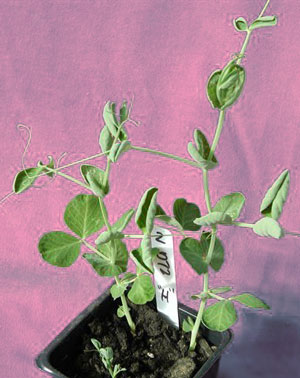 |
| This pea plant shows the cupped leaves that indicate the soil contains damaging levels of a potent herbicide. |
Last fall, our report on manure, hay and compost contaminated with Milestone herbicide (aka aminopyralid), made by Dow AgroSciences) told of 2008’s tragic summer in the United Kingdom, where thousands of gardeners lost their tomatoes, beans and other sensitive crops to manure and hay laced with this potent, highly persistent herbicide. This year the problem has hit home, with U.S. gardeners, organic farmers and commercial growers reporting damaged or lost tomato crops from Milestone contamination. (Aminopyralid is also sold under the brand name of Forefront.)
Why now? “We had the perfect storm to set up the situation,” says Dr. Jeanine Davis, associate professor of horticulture at North Carolina State University and author of several recent extension service advisories about Milestone’s persistent toxicity.
The drought caused animal owners to buy hay trucked in from other areas, and at the same time many people created new vegetable gardens and bought contaminated compost, or hay to use as mulch.”
Davis is now receiving notices daily from growers and extension agents across the country who are seeing vegetables damaged by manure, hay or compost contaminated with Milestone. Tomatoes are highly sensitive; symptoms including curled, cupped leaves and wilting new growth are often misdiagnosed as a virus or disease problem.
Organic growers who have lost their crops suffer a double punch because they lose certification on the contaminated land. Recovery can take a long time. In a former North Carolina hay field treated with Milestone (one of several aminopyralid products) in June 2006, residue levels were high enough to damage tomatoes in 2009 — three years later.
All of this leaves Dow Chemical holding a bag of trouble, but maybe it won’t be so bad since the company reportedly has bought web rights to www.banaminopyralid.com. Is that smart damage control, or what? And business looks good judging from the number of U.S. highway departments, foresters, utility companies, and other big land managers that are buying the stuff by the ton. You tell me: When a deer grazes on treated vegetation in the power cut behind my house and relieves herself as she passes through my garden, who’s responsible for the fact that some of my soil is now useless for growing beans, peas, lettuce, tomatoes and many other crops for four years — or more. Do we really want to allow companies to make their profits by selling chemicals that are this potent?
Meanwhile, in the United Kingdom, Milestone/aminopyralid has been pulled from the market pending further study. Damage reports continue to mount as the extent of the problem becomes known.
This entire problem is a repeat of damage that surfaced several years ago in the United States from another persistent Dow herbicide, clopyralid (sold as Reclaim, Stinger, Hornet, Transline, Confront, Lontrel, Curtail and Millenium Ultra). Dow was marketing clopyralid for broadleaf weed control on residential lawns, which meant it was contaminating grass clippings used to make municipal composts. Researchers eventually traced mysterious damage in gardens across the United States to the herbicide residues in composts.
Why is this happening all over again?! These poisons are so powerful that they can persist for years, and they can damage sensitive crops at levels as low as 10 parts per billion, according to an Ohio State University factsheet. In some cases the lab tests needed to detect them at those levels had not even been developed.
It is absurd that the EPA is allowing these chemicals on the market. The herbicide labels warn about these dangers, but there is simply no way that any farmer selling contaminated hay (or giving away manure) is going to label it, so that consumers will know that it is toxic. It’s time for us to demand that the EPA take immediate action to protect us from these poisons. The Rachel Carson Council has taken the lead, writing to the EPA last fall to urge them to protect our gardens from Milestone herbicide toxicity. To join them, call or e-mail Kathryn Montague (703-305-1243; montague.kathryn@epa.gov).
In addition to complaining to the EPA, we urge you to report problems to your local and state extension offices (and to local news media so they can warn gardeners), and to post comments below to help us monitor this problem. Lab testing to confirm contamination is expensive, but there is a simple test you can run at home to help determine if your growing medium is or is not safe for growing crops.
